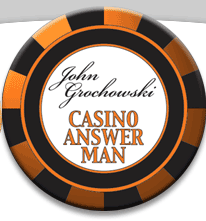Over the years, I've debunked a fair number of roulette systems.
There's the Martingale, where you double your bet after each loss.
Hazardous to your bankroll. Bets get very large, very fast. Even if you
can afford the action, you'll will bump up against table maximums often
enough to sink the system.
There's the cancellation, where you start by writing three numbers,
the sum equaling your win goal for the sequence. In a three-number
cancellation with a win goal of three units, you'd write 1, 1, 1. Your
first bet is the sum of the end numbers, so you start with a two-unit
bet. A win cancels the end number --- that's the cancellation part ---
so your next wager ins the remaining bet. Win that, cancel out the
number, and you've won your goal.
What if you lose? You then write your wager in units at the end of
your number sequence. Start with 1, 1, 1, wager two units and lose, and
you're left with 1, 1, 1, 2. Your next wager is three units --- the sum
of the two end numbers.
The problem? You're still increasing wagers as you lose. It's not as
dangerous a system as the Martingale, but a few losses in a row
stretches out the sequence, and it's not unusual for your row of numbers
to get so long it'd take an unusual hot streak to get you back to even.
One close friend likes to extend play at roulette by betting on black
plus an equal amount on the third column. Eight of the numbers in the
third column are red, so my friend covers 26 of the 38 numbers --- all
18 black numbers plus eight red. If a black in the first two columns
shows up, he breaks even, winning on black but losing the column bet. If
one of his eight reds turns up, he makes a one-unit profit, winning a
2-1 payoff on the column while losing on black. But if the ball lands on
one of the four third-column blacks, he wins triple --- even money on
black, plus 2-1 column.
Of course, there's the pesky matter of the 10 red numbers he doesn't
cover, plus 0 and 00. Any of those dozen numbers bring a double loss.
Undermining all roulette systems is that the house edge never rests.
Whether you're betting red or black, dozens or columns, single numbers
or three-number streets, that 5.26 percent house edge is always working
against you. The exception is if your system includes the five-number
bet on 0, 00, 1, 2 and 3. Then a little higher house edge is working
against you, since the house has a 7.89 percent advantage on that bet.
Still, few players just throw their chips out willy-nilly when they
play roulette. Nearly everyone uses a system of some sort, whether it's
in how they choose their numbers, or in how they raise or lower their
bets.
My friend who likes the black-plus-third-column system pressed me for
my system. "Come on," he said.
"Everybody has a system. What do you
do?"
And I do have a system. A really easy one. I play family birthdays.
So does my wife. When we play together, we're usually on different
numbers. I play her birthday, and she plays mine.
Given a balanced wheel, no number is any more likely than any other
to come up, so why not have some fun? It might even produce a memorable
moment.
It did for me one day in Las Vegas, playing at a wheel with a $1
minimum bet, and with 25-cent chips available. It was my birthday, so I
was betting on myself. I put a chip on No. 29, and surrounded it with a
chip on each of the corners and splits surrounding it.
I had a nice streak. No 29s, but the two-number splits, paying 17-1,
and four-number corners, paying 8-1, were hitting regularly. My stack
was growing, and I increased to two chips on each bet.
I heard the ball drop, and the dealer said, "Uh-oh. Here we go."
It was No. 29.
The four corner bets each brought me 16 chips in winnings. The four
splits each brought 34. The single number bet brought 70. Suddenly I had
270 extra chips in front of me, and my nine two-chip bets were still on
the table.
The next number: 29. I raked in another 270 chips.
That was the end of the streak. The second 29 was followed by an 11. I
exchanged my roulette chips for casino chips, tipped the dealer and
left with a profit of more than $125.
When I told my systems-playing friend that story, he said, "Don't you
wish you were playing with dollar chips? Too bad it was only quarters."
I told him I had no such wishes. I play roulette for relaxation, and I
play only at low-limit tables. I was thrilled to walk away with such a
profit.
Besides, I told him, I know what the house edge is on that system,
and I don't care to bet too much money against that kind of an edge.
In roulette, the magic number for the house is almost always 5.26.

No comments:
Post a Comment